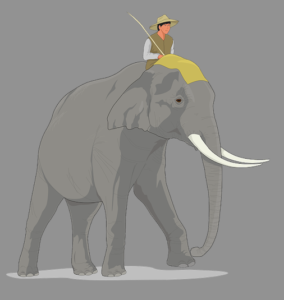There is tremendous amount of discussion about the fast evolving future of work. While there are many assumptions about the future, many experts agree that it will be difficult to predict clearly and continue to evolve quickly. They also seem to agree that machine learning will become faster than human learning in near future. Some work may continue to be local in nature and highly valued. Some may get automated. One way to succeed or even survive in future could be to proactively develop an ability to continuously observe, reflect, learn and take adaptive actions at an individual and systemic level.
So, from an education or learning perspective, how do you prepare students for the future of work?
We can start with couple of basic premises.
- Success at work or life will continue to depend on a set of distinguishing abilities, behaviors or habits.
- The environment we are in can influence and impact them.
If educators can figure out ways to develop the following key behaviors for students through interventions and, if students can consciously develop them, readiness increases.
Three key behavioral elements for learning to inculcate early are:
- Curiosity, Continuing To Explore and Asking Questions
- Openness To Experimenting, Failure and Rework
- Achieving Independence Through Confident and Responsible Actions
Educators should consider various ways in which the above behavioral elements can be developed early in their students by designing their learning environments and related processes. As we know, habits once formed early are not easy to change.
Some examples on potential interventions – Classrooms should be include quality time for reflecting on the learning process, explore and develop multiple approaches and seeking out answers together in different ways. In a fast evolving and uncertain world, lack of curiosity in individuals or organizations leads to quick decline. Teachers should become facilitators of the learning process rather than aiming to become the database of answers. The process of figuring out answers should be encouraged and rewarded. Teachers should be open to exploring and learning together with their students. Labs should be places where students should enjoy experiments and figuring various approaches towards answers while becoming comfortable with working through failures. The focus there should not be on getting the right result but rather experimenting and figuring out. The “growth mindset” should be encouraged across the board. Teachers should encourage students to step up at every possible opportunity and experience the different aspects of taking actions with confidence and responsibility, inside and outside the classroom.
Educators have to themselves think deeper and modify their approaches to help prepare their students for a fast evolving future where the nature of work may evolve. Doing what made them and their students successful in the past may not apply for the future. There are of course various aspects to thinking through this. The fundamental point is to start looking at developing fundamental behaviors that enable students to navigate and adapt effectively in an unclear future, when the content itself may not matter as much as the context and behaviors. Start with and focus on one or two. Exploring these scenarios will also force you as educators to effectively contemplate and redesign your future of work.





Recent Comments